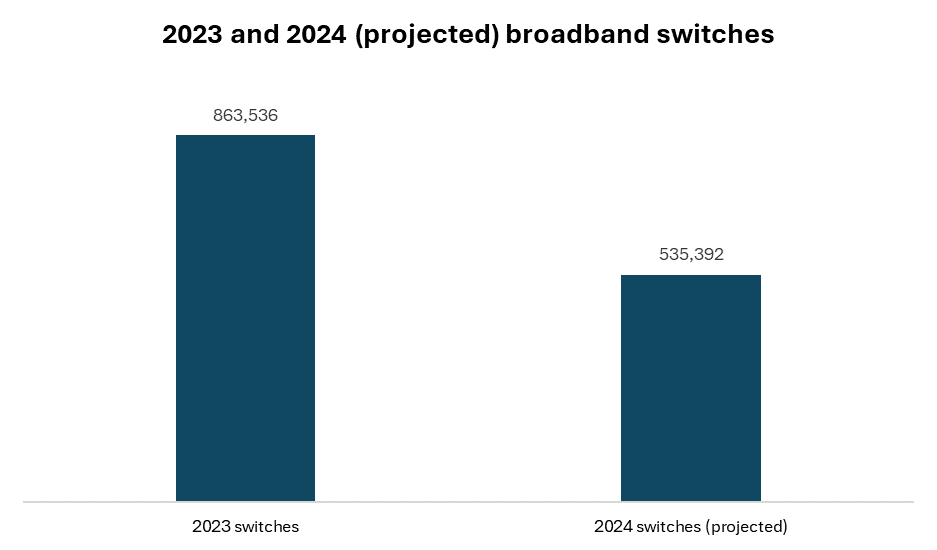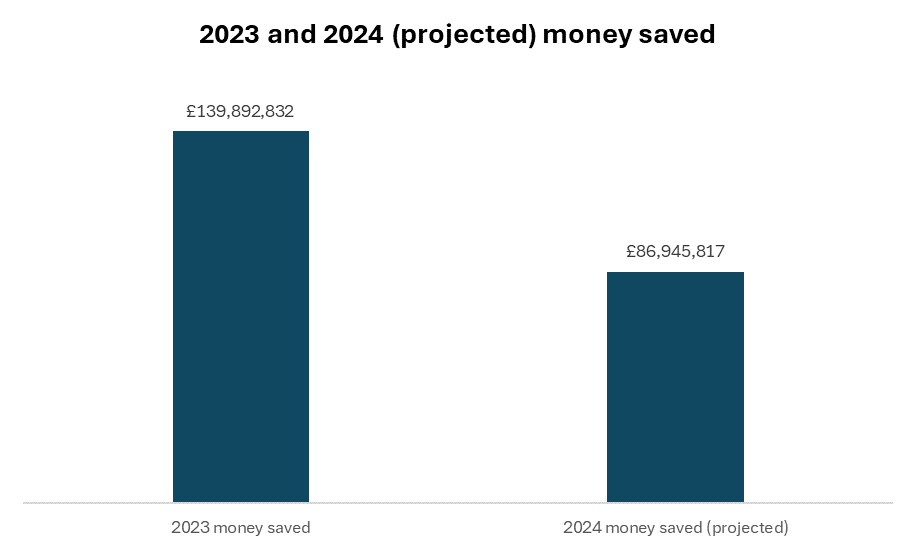No one wants to see the price of their monthly broadband bill increase without any power to bring it back down. However, raising customers' monthly subscription has been standard practice over the last decade for many mainstream providers.
Since 15th December, publishers of broadband contracts have adjusted the way they advertise these deals. Any deal, which will be raised mid-contract, must be disclosed when advertised.
Image 1: Broadband deal card pre 15th December 2023

Image 2: Broadband deal card post 15th December 2023 (after new regulations were implemented)

On the face of it, this seems like a good idea; it’s more transparency for customers, so nobody gets a nasty shock when they see their bill suddenly increase in the Spring.
However, this has also had an unexpected knock on effect. Switching providers is an important part of the broadband market. On average, shoppers save £162 a year by switching their broadband deal. But since the ruling, broadband switches are down 38% year-on-year. This has left UK customers worse off by a whopping £53m.
Affiliate network, Awin reported 863,536 broadband switches in 2023, but if this trend continues, this number will drop 328,144 switches to 535,392.
Graph 1: Drop in switches

In 2023, broadband shoppers saved £139,892,832 in 2023. A 38% drop across the year would see this amount fall to £86,945,817, or just short of £53m (£52,947,015) in savings lost for broadband bill payers.
Graph 2: Drop in savings for broadband switchers

Mainstream providers such as BT, EE or Virgin Media annually raise prices for their customers inline with inflation using the Consumer Price Index (CPI) or Retail Price Index (RPI), with an additional percentage increase on top, usually around 3.9% (this excludes the CPI and RPI percentage).
This year's price increases coming in April are set to be a hefty 7.9%. Price rises came into the spotlight last year when, because of high inflation, broadband customers were hit with colossal increases up to 14.4%.
The Advertising Standards Authority (ASA) took action, setting new regulations on how broadband deals that will incur mid-contract price changes need to be displayed.
So why doesn’t the ASA ban providers from doing this?
While the ASA can investigate and change how broadband deals are advertised, it doesn’t have the power to modify what broadband providers put into their contracts. Only Ofcom, which is currently investigating mid-contract price rises, has the power to do this.
We asked the ASA - the driving force behind these new broadband advertising rules, the following questions:
- In light of our findings, are broadband shoppers are worse off since the introduction of these new rules?
- Do the rules need to be adjusted?
- Would it be easier, from an advertising perspective, to ban mid-contract price rises?
Toby King, Senior Media Relations Officer at ASA, commented: “The guidance on mid-contract price increases is aimed at ensuring information about price increases - which is likely to be important to people’s decision-making - is clear and prominent, to minimise the chances of them being misled into thinking the initial price will apply throughout the contract if that isn’t the case.
“Ofcom are consulting on banning inflation-linked price increases altogether - if that is implemented, then we will amend our guidance accordingly.
“We will continue to monitor the situation and adjust our guidance where appropriate.”
However, not all providers raise their prices midway through a deal for their customers. Providers such as Cuckoo, Hyperoptic and Zen Internet chose not to put price rises in the small print of their contracts.
We asked Tommy Toner, Chief Experience Officer at internet service provider Cuckoo, what it thought of our findings and why it decided not to raise prices for customers.
“It comes as no surprise that people are worried about switching broadband. For too long, the likes of EE, TalkTalk and Virgin Media have posted huge profits off the back of sneaky price rises which have left people upset and out of pocket”.
“At Cuckoo, we value our customers. People deserve to be treated fairly, which is why we don’t increase our prices mid-contract. Pricing should be fixed for the duration of the contract, and mid-contract price rises are one of the broadband industry’s dirtiest tricks”.
“The practice has gone on for far too long. Instead, broadband should be fast, fair and feel good.”
We at Broadband Genie are calling on Ofcom to ban mid-contract price rises outright and, until then, for customers not to be put off from switching to a cheaper deal.
Alex Tofts, broadband expert at Broadband Genie, comments: “Switching is an important part of the broadband market and for years, the larger providers have got away with burying price rise information into the small print of contracts.
“Customers need prices to be crystal clear. The ASA intended to reduce the confusion that bill payers experience when they see a jump in their contract, but sadly, it’s had the knock-on effect of scaring customers off trying to save money.
“Our analysis indicates that the new rules are a clear deterrent for shoppers looking to switch their deal.
“While we fully support Ofcom's efforts to curb inflation-linked price hikes, the only solution is to ban mid-contract price rises outright. If smaller providers such as Hyperoptic and Cuckoo can afford to commit no price rises, there is no reason why the larger providers shouldn’t follow suit.
“Customers who have reached the end of their minimum term shouldn’t be discouraged from switching and saving. Although the majority of broadband providers are applying price rises in the spring, the longer you remain on an expired deal, the worse the hikes will affect you.”
A petition to ban mid-contract price rises has reached over 130,000 signatures and can be found here.
-
Methodology
The findings from Broadband Genie showing that UK broadband bill payers are almost £53m worse off are based on an analysis of all broadband switches through the affiliate tracking network Awin which tracks the majority of broadband switches.
Awin data showed a decrease of 38% in broadband switches during the period of 15th December 2023 - 12th February 2024 (after new regulations were implemented) compared to the same period in the previous year (15th December 2022- 12th February 2023).
- Awin reported a total of 863,536 broadband switches in 2023
- On average, shoppers save £162 a year by switching their broadband deal
- 863,536 x £162 = £139,892,832 (broadband savings in 2023)
- 38% of £139,892,832 = £52,947,015